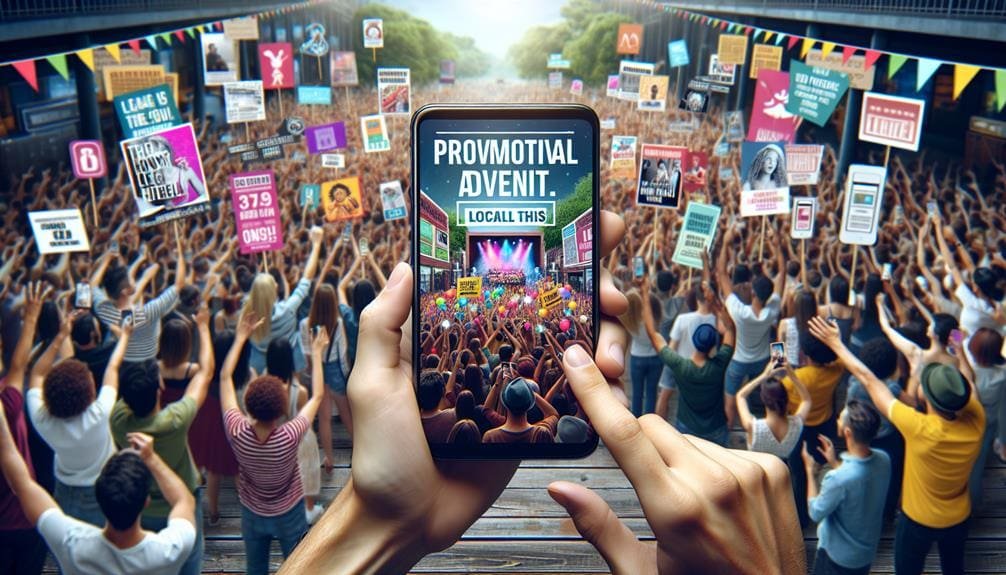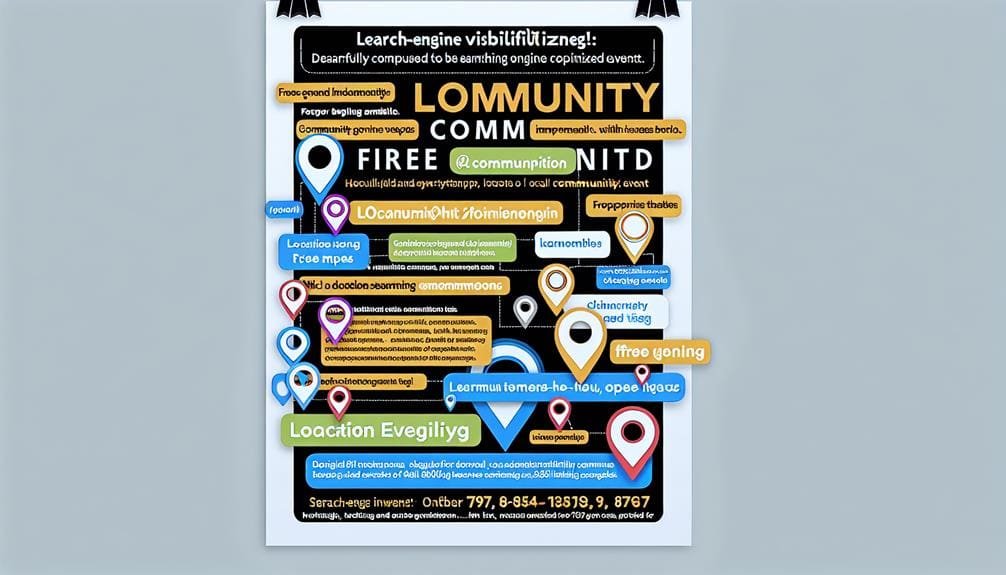10 Tips for Custom SEO Strategies for Community Events
January 30, 2024 | by Jacob Cavazos

Nearly 93% of all online experiences begin with a search engine, underscoring the vital role of SEO in internet visibility. We know that for community events to thrive, they must be easily discoverable online, where a significant portion of potential attendees start their search. Our focus on custom SEO strategies is grounded in a data-driven approach, ensuring that every tip we share is not only actionable but also clear in its potential impact. From honing in on audience targeting and keyword selection to the nuances of localized content optimization, we're here to guide event planners through the maze of SEO complexities. As we unpack these top strategies, we'll explore how subtle adjustments to your online presence can significantly enhance your event's search engine ranking, ultimately boosting attendance and engagement. Stay with us as we reveal insights that could transform your next community event into the talk of the town.
Audience Targeting and Keywords
To effectively reach the right audience for your community event, it's crucial to start with in-depth keyword research and a clear understanding of your target demographic. We must delve into the data, using analytics tools and competitor analysis to pinpoint precisely what our target audiences search for. This insight allows us to craft an SEO strategy for the event that's not just theoretically sound but practically effective.
We're not just throwing darts in the dark; we're leveraging hard data to select keywords that resonate with our audience's search habits. We strategically integrate these keywords into our website content, meta descriptions, title tags, and headers. This isn't a one-off task; it's an ongoing process that demands continuous monitoring and tweaking to stay aligned with the ever-changing search engine algorithms and user behaviors.
Furthermore, for event marketing, we hone in on local SEO. We incorporate location-specific keywords, ensuring our event shows up in local searches. We don't overlook the basics either—registering in local directories and setting up a Google My Business profile are essential steps.
In mastering these tactics, we aren't just hoping to capture attention; we're positioning ourselves to be the top search result when our community looks for events like ours.
Localized Content Optimization

Building on our foundation of audience targeting and keyword selection, we'll now enhance our SEO efforts by focusing on localized content optimization for our community event. To ensure we're not only found but also resonate with our local audience, we're implementing a targeted strategy that leverages the unique aspects of our location.
Here's how we're doing it:
- Location-Specific Keywords: We're infusing our content with keywords that are specific to our community, including local landmarks and event details to capture relevant local search queries.
- Local Information: Our website and meta tags now feature local addresses, landmarks, and contact information, ensuring we appear in search results when potential attendees are looking for local events.
- Local Directory Listings: We're creating a robust presence in local directories and have set up a Google My Business profile, encouraging reviews to boost our local SEO.
- Local Backlinks: By securing backlinks from influential community websites and blogs, we're increasing our event's local visibility and credibility.
Our localized content optimization efforts are data-driven and goal-oriented. We're focusing on connecting deeply with our community to not just attract attendees, but also to engage local sponsors and exhibitors.
Event Schema Markup

We'll now explore how Event Schema Markup can elevate your community event's online presence. By implementing markup correctly, we ensure search engines clearly understand and showcase event specifics, boosting our chances for those eye-catching rich results. Grasping the full benefits of structured data, from increased visibility to direct ticket links, is key to attracting more attendees and making our event a success.
Understanding Event Schema
Understanding Event Schema Markup is crucial for event organizers aiming to enhance their event's online visibility and searchability through structured data. Here's how we can master this tool:
- Implement Event Schema on your website to give search engines clear details like date, time, and location.
- Use the markup to enable your event's inclusion in Google's special SERP features, such as the event pack.
- Employ schema markup to create rich snippets that stand out in search results with visually appealing details.
- By integrating Event Schema, we not only boost visibility but also attract more attendees, improving our SEO efforts.
Concisely, leveraging structured data through event schema is an actionable strategy that can significantly enhance our event's online presence.
Implementing Markup Correctly
To ensure your community event gains maximum online visibility, it's essential to implement Event Schema Markup accurately and strategically. By integrating this schema markup into your event website, we provide search engines with structured data that's pivotal for search engine optimization (SEO). This method ensures key details, including dates, location, and ticketing information, are prominently displayed in search results. Our focus is on improving user engagement through direct access to relevant information, which often leads to better click-through rates. As we leverage Event Schema Markup, we're not just improving user experience; we're making our events more discoverable and distinct in search engine results pages (SERPs). With meticulous implementation, we set the stage for attracting a higher number of attendees and achieving our event's success.
Benefits of Structured Data
Building on our meticulous implementation of Event Schema Markup, it's clear that structured data brings a host of benefits, including enhanced visibility for community events on SERPs. Here's how:
- Improved SERP Visibility: Search engines understand structured data, allowing them to display event details prominently.
- Rich Snippets: Structured data enables rich snippets, which offer quick event insights directly in search results, captivating potential attendees.
- Detailed Information: Relevant event information like date, location, and time is highlighted, which is crucial for user planning.
- Special SERP Features: There's a higher chance of being featured in Google's event pack, increasing event exposure and accessibility.
These strategic advantages underscore the importance of structured data in our SEO arsenal, providing actionable insights to dominate digital competition.
Building Quality Backlinks

Crafting a robust backlink profile requires strategic outreach to high-authority websites that align with our community event's theme and audience. We prioritize link building with reputable websites, ensuring that each backlink contributes to our site's credibility and search engine rankings. By focusing on quality backlinks, we not only bolster our SEO efforts but also connect with platforms that our target audience trusts.
To achieve this, we engage in guest blogging on well-regarded sites within our niche, collaborate with influencers who resonate with our community, and create content that naturally attracts shares and links. It's crucial that we target websites with high domain authority because links from these sites have a stronger impact on our event's online visibility.
We're committed to steering clear of black hat tactics. Buying links or entering link schemes can do more harm than good, leading to penalties that damage our reputation and SERP standings. Instead, we aim for a diverse backlink profile with varied anchor texts and link types from a range of authoritative sources. This strategy not only enriches our SEO efforts but also lays a foundation for sustainable online growth and community engagement.
Leveraging Social Media

While we've established the importance of a strong backlink profile, it's equally crucial to harness the power of social media to amplify our community event's reach and search engine presence. Here's how we can leverage these platforms effectively:
- Regular Content Updates: We'll utilize social media platforms to post regular updates about our event. This keeps our audience engaged and helps drive traffic back to our website, which is a positive signal for search engines.
- Calls to Action and Sharing: Social media posts should include clear calls to action and easy-to-share buttons. This encourages our followers to engage with our content and spread the word, thereby amplifying our message.
- Facebook Events and Cross-Promotion: By creating a Facebook event and promoting it across various social media profiles, we not only attract attendees but also improve our event's SEO footprint.
- Engagement Metrics: We'll tap into the power of social media users to increase event visibility. High engagement rates can lead to more shares and mentions, which are beneficial for SEO.
Online Directory Submissions

When we tackle online directory submissions, we prioritize selecting suitable directories that align with our event's theme and audience. We meticulously optimize our directory profiles to ensure they're robust and reflective of our brand, enhancing our SEO efforts. It's crucial for us to track the impact of these submissions, analyzing data to measure the improvement in our search engine rankings and website traffic.
Selecting Suitable Directories
To maximize the visibility and reach of your community event, it's essential to carefully select online directories based on their relevance, authority, and audience engagement. Here's how we ensure we're choosing the right directories:
- Relevance: We target directories that align with our event's niche or local area to improve local search results.
- Authority: We prioritize submissions to directories with high domain authority for a stronger SEO impact.
- Engagement: We look for directories with active user engagement to ensure our event gets noticed.
- Maintenance: We commit to regularly updating our listings, especially on platforms like Google My Business, to keep information accurate.
Optimizing Directory Profiles
Having identified the most suitable directories for community events, it's now crucial to optimize our directory profiles to ensure maximum visibility and engagement. We need to embed location-specific keywords within our profiles and meta tags, enhancing local SEO. This strategic placement of relevant keywords will significantly improve our event's discoverability.
Reviews and ratings from local attendees will elevate our credibility and boost our visibility in online directories. Listing our event on these platforms is essential to attract a more local audience and increase attendance.
Here's a quick guide to optimizing our event directory profiles:
| Aspect | Action Item |
|---|---|
| Keywords | Integrate relevant SEO terms into profile descriptions |
| Event Information | Accurately detail the event on the event website and directories |
| Reviews | Encourage local attendees to review the event |
This table breaks down the key areas we'll focus on to maximize our event's online presence.
Tracking Submission Impact
We'll now delve into how to effectively track the impact of our online directory submissions, focusing on tangible metrics such as referral traffic, conversion rates, and SERP rankings. Utilizing tools like Google Analytics and Google Search Console, we can gather accurate data to understand the effectiveness of our submissions. Here's what we track:
- Referral Traffic: Analyze the volume and behavior of visitors coming from directories.
- Conversion Rates: Measure how many directory referrals lead to desired actions.
- SERP Rankings: Monitor changes in our event's search engine ranking positions pre- and post-submission.
- User Engagement: Evaluate the click-through rate and time spent on our site by visitors from directories.
These metrics provide a clear picture of our strategy's success and inform future optimizations.
Creating Shareable Event Pages

Crafting an engaging event page requires a blend of rich content, captivating images, and precise event details, all optimized with SEO best practices to ensure maximum shareability and visibility online. We understand that an event page is crucial for drawing attention and sparking excitement. By implementing schema markup, we provide search engines with structured data that enhances our event's visibility in search engine results pages (SERPs).
We carefully optimize our event page titles, meta descriptions, and headers with targeted keywords, which are essential for improving our search engine rankings. This ensures that when someone searches for events like ours, our page stands out.
Moreover, we encourage user-generated content and integrate social sharing features. These elements not only foster engagement but also increase the likelihood of our event page being shared. We're creating shareable content that resonates with our community and compels them to spread the word.
To facilitate seamless sharing, we've incorporated social media integration on our event page. This allows visitors to effortlessly share our event across their preferred social media channels with just a click. It's about making the sharing process as intuitive as possible, removing any friction that might deter someone from spreading the news about our event.
Engaging With Community Online

We've seen that leveraging social media platforms can significantly amplify our event's visibility. By initiating online discussions and encouraging community members to share their experiences, we're creating a buzz that's both organic and engaging. Partnering with influencers and local groups further strengthens our online presence, making our event the talk of the town.
Utilize Social Media Platforms
To effectively engage with our community online, it's crucial to actively participate in social media conversations, promptly respond to comments, and share content that resonates with our audience. Here's how we can harness the power of social media to promote our event:
- Create engaging polls, Q&A sessions, and interactive posts to foster a two-way conversation and gain valuable insights.
- Share exclusive behind-the-scenes looks and event preparations to build anticipation and a sense of exclusivity.
- Collaborate with influencers and local leaders to amplify our message and extend our reach.
- Analyze social media analytics to refine our content strategy, ensuring it aligns with our audience's interests and behaviors.
Foster Online Discussions
Engaging the community through online discussions not only sparks interest in our event but also fosters a sense of belonging among participants. We're committed to leveraging social media to create spaces where our audience can actively engage with the event's theme. By encouraging user-generated content, we ensure that the audience is searching for and contributing to the conversations that matter most.
Here's a practical table to guide our strategy:
| Platform | Engagement Technique | Expected Outcome |
|---|---|---|
| Live Q&A Sessions | Immediate Feedback | |
| Hashtag Discussions | Trending Topics | |
| User Stories Sharing | Visual Engagement | |
| Industry Forums | Professional Networking | |
| YouTube | Virtual Meetups | In-depth Interaction |
We'll actively participate in these forums to amplify user experience and community involvement, driving the success of our event.
Monitoring SEO Performance

As event organizers, it's crucial that we consistently track our website's search engine performance to gauge the success of our SEO strategies. By monitoring SEO performance, we can make data-driven decisions to optimize our online presence and attract more attendees to our community events. Here's how we do it:
- Analyze Search Engine Rankings: We regularly check our website's position in search engine results for targeted keywords, understanding that higher rankings drive more organic traffic.
- Utilize Google Analytics: This tool helps us dive into our website's traffic data, including user behavior and demographics, to see where our SEO efforts are succeeding and where they need improvement.
- Monitor Competitor Performance: By observing our competitors' SEO tactics, we can identify gaps in our own strategy and unveil new opportunities to outshine them in search results.
- Stay Updated on Algorithm Changes: Search engines frequently update algorithms, and we stay informed to ensure our website adheres to the latest guidelines, preventing potential drops in rankings.
We're committed to refining our SEO strategy based on these insights, ensuring that we're not only competing effectively but also providing the best possible experience for our community event attendees.
Adapting Strategy Post-Event

After the excitement of our community event settles, we dive into post-event data analysis to sharpen our future SEO strategies. We scrutinize user engagement and behavior, leveraging this wealth of information to fine-tune our approach. It's critical to adjust our keywords and content, ensuring they reflect the most current post-event information and details of upcoming events. This keeps our event website up-to-date and relevant, a core factor in maintaining SEO efficiency.
We also harness user-generated content and feedback, which are gold mines for enhancing our SEO tactics. This content not only boosts our authenticity but also provides fresh material that search engines favor. It's important to continually monitor these contributions, integrating them into our event website to improve our search rankings and user experience.
Furthermore, we update our website and social media profiles with post-event content and announcements, nurturing continued engagement. We're not just looking back; we're already paving the way for future interactions.
Lastly, we implement new local SEO strategies informed by the event's impact and attendee feedback. We use tools like Google Analytics to understand what resonated with our audience, allowing us to pivot our strategy where necessary. Every piece of data is a stepping stone to a more targeted and effective SEO plan.
Frequently Asked Questions
How Do You Create an Effective SEO Strategy?
We'll create an effective SEO strategy by conducting thorough keyword research, optimizing our content for relevance, and engaging in robust link building to enhance our online presence and drive targeted traffic to our site.
What Is SEO in Event Planning?
We're navigating the SEO landscape to enhance event visibility, integrating event hashtags, leveraging speaker optimization, and establishing venue backlinks, ensuring our event shines like a beacon to search engines and potential attendees alike.
How Do I Create a Local SEO Strategy?
We'll create a local SEO strategy by integrating event hashtags, leveraging Google MyMaps for visibility, and forging community partnerships to enhance local engagement, following a data-driven and clear approach for our mastery-driven audience.
What Are the Top Three SEO Strategies?
We prioritize keyword research, content optimization, and link building as our top three SEO strategies, ensuring each tactic is data-driven and clear to masterfully improve our website's search engine rankings and visibility.
RELATED POSTS
View all



